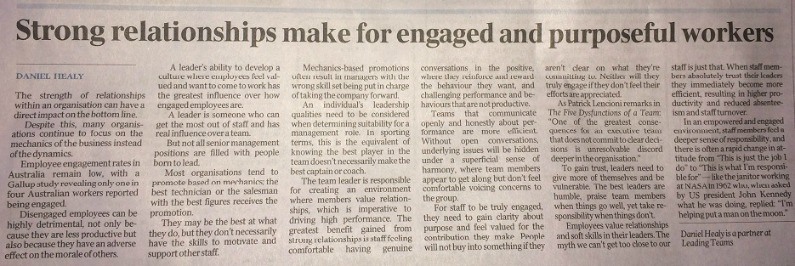This by-line was first published by The Australian, appearing in the Weekend Professional section on 26th September 2015, written by our Adelaide facilitator, Daniel Healy.

The strength of relationships within an organisation can have a direct impact on the bottom line.
Despite this, many organisations continue to focus on the mechanics of the business instead of the dynamics.
Employee engagement rates in Australia remain low, with a Gallup study revealing only one in four Australian workers reported being engaged.
Disengaged employees can be highly detrimental, not only because they are less productive but also because they have an adverse effect on the morale of others.
A leader’s ability to develop a culture where employees feel valued and want to come to work has the greatest influence over how engaged employees are.
A leader is someone who can get the most out of staff and has real influence over a team.
But not all senior management positions are filled with people born to lead.
Most organisations tend to promote based on mechanics; the best technician or the salesman with the best figures receives the promotion.
They may be the best at what they do, but they don’t necessarily have the skills to motivate and support other staff.
Mechanics-based promotions often result in managers with the wrong skill set being put in charge of taking the company forward.
An individual’s leadership qualities need to be considered when determining suitability for a management role. In sporting terms, this is the equivalent of knowing the best player in the team doesn’t necessarily make the best captain or coach.
The team leader is responsible for creating an environment where members value relationships, which is imperative to driving high performance. The greatest benefit gained from strong relationships is staff feeling comfortable having genuine conversations in the positive, where they reinforce and reward the behaviour they want, and challenging performance and behaviours that are not productive.
Teams that communicate openly and honestly about performance are more efficient. Without open conversations, underlying issues will be hidden under a superficial sense of harmony, where team members appear to get along but don’t feel comfortable voicing concerns to the group.
For staff to be truly engaged, they need to gain clarity about purpose and feel valued for the contribution they make. People will not buy into something if they aren’t clear on what they’re committing to. Neither will they truly engage if they don’t feel their efforts are appreciated.
As Patrick Lencioni remarks in The Five Dysfunctions of a Team: “One of the greatest consequences for an executive team that does not commit to clear decisions is unresolvable discord deeper in the organisation.”
To gain trust, leaders need to give more of themselves and be vulnerable. The best leaders are humble, praise team members when things go well, yet take responsibility when things don’t.
Employees value relationships and soft skills in their leaders. The myth we can’t get too close to our staff is just that. When staff members absolutely trust their leaders they immediately become more efficient, resulting in higher productivity and reduced absenteeism and staff turnover.
In an empowered and engaged environment, staff members feel a deeper sense of responsibility, and there is often a rapid change in attitude from “This is just the job I do” to “This is what I’m responsible for” — like the janitor working at NASA in 1962 who, when asked by US president John Kennedy what he was doing, replied: “I’m helping put a man on the moon.”
Daniel joined Leading Teams in 2013 after an AFL playing and coaching career where he had first-hand experience of our program over 20 years. Daniel is a Facilitator/Partner based in Adelaide.
Learn more about Daniel.



